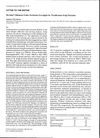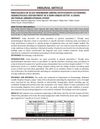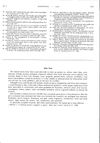 1 citations,
February 1988 in “The BMJ”
1 citations,
February 1988 in “The BMJ” The document explains different hair and scalp conditions, including common hair loss after pregnancy or illness, drug-induced hair loss, hereditary excessive hair growth, patterned baldness, autoimmune hair loss, and permanent loss due to skin disease, with generally limited treatment options.
 8 citations,
September 2004 in “Contact dermatitis”
8 citations,
September 2004 in “Contact dermatitis” Avoiding dyed wigs and clothing improved severe allergic reactions in a woman treated with diphencyprone.
 2 citations,
October 2020 in “The Journal of clinical and aesthetic dermatology”
2 citations,
October 2020 in “The Journal of clinical and aesthetic dermatology” The herbal mix (Biochanin A, Acetyl tetrapeptide-3, and Ginseng Extracts) and the 3% Minoxidil solution are equally effective in treating hair loss, but the herbal mix has fewer side effects.
 4 citations,
January 2016 in “Postepy Dermatologii I Alergologii”
4 citations,
January 2016 in “Postepy Dermatologii I Alergologii” Many hair diseases, including those caused by medications and psychological issues, can lead to hair loss and require proper treatment and specialist care.
 1 citations,
December 2007 in “Drug and therapeutics bulletin”
1 citations,
December 2007 in “Drug and therapeutics bulletin” New treatments for children's scalp ringworm are recommended based on recent data.
 88 citations,
April 2011 in “Archives of Dermatology”
88 citations,
April 2011 in “Archives of Dermatology” Type 2 diabetes, bacterial scalp infections, and tight hairstyles like braids and weaves are linked to a higher risk of a scarring hair loss condition in African American women.
2 citations,
January 2013 in “Journal of cosmetics, dermatological sciences and applications” Using a special shampoo and scalp tonic together can greatly reduce severe dandruff and its causes.
 98 citations,
November 2002 in “Contact Dermatitis”
98 citations,
November 2002 in “Contact Dermatitis” Many people had severe allergic reactions to a common hair dye ingredient, causing them to seek medical care and miss work.
 5 citations,
October 2020 in “Lasers in Medical Science”
5 citations,
October 2020 in “Lasers in Medical Science” Combination therapy works best for female hair loss, increasing density and thickness.
 8 citations,
April 2020 in “Journal of The American Academy of Dermatology”
8 citations,
April 2020 in “Journal of The American Academy of Dermatology” Oral minoxidil is a reasonably safe alternative for patients allergic to the topical form.
 76 citations,
November 2010 in “Journal of The American Academy of Dermatology”
76 citations,
November 2010 in “Journal of The American Academy of Dermatology” Some African American women's central scalp hair loss is linked to genetics and past fungal scalp infections, with more research needed on other causes.
 1 citations,
January 2015 in “Springer eBooks”
1 citations,
January 2015 in “Springer eBooks” The document says a skin condition called alopecia areata causes hair loss and stress, and is treated with strong skin creams, injections, or other therapies, but treatment success varies.
 109 citations,
December 1998 in “The Journal of Dermatology”
109 citations,
December 1998 in “The Journal of Dermatology” Manipulating the catagen and telogen phases of hair growth could lead to treatments for hair disorders.
2 citations,
January 2022 in “Anais brasileiros de dermatologia/Anais Brasileiros de Dermatologia” Chemical hair straighteners can cause scalp and hair damage, but long-term effects are unclear.
 8 citations,
April 2006 in “Acta dermato-venereologica”
8 citations,
April 2006 in “Acta dermato-venereologica” Dovobet ointment used overnight effectively reduces scalp psoriasis severity and itch.
 February 2018 in “Journal of dermatology & cosmetology”
February 2018 in “Journal of dermatology & cosmetology” Combining microdermabrasion with steroid injections improves hair regrowth in scalp alopecia areata.
 1 citations,
July 2016 in “Cosmetics”
1 citations,
July 2016 in “Cosmetics” Black henna tattoos can cause severe allergies to hair and textile dyes, and there's a need for greater public awareness and regulation.

Dupilumab helped improve skin and prevent new lesions in a child with a rare immune disorder and severe eczema.
 1 citations,
May 2015 in “Journal of evolution of medical and dental sciences”
1 citations,
May 2015 in “Journal of evolution of medical and dental sciences” Many patients at a dermatology clinic had scalp problems, often unrelated to why they visited, suggesting scalp checks should be regular.
 September 2022 in “bioRxiv (Cold Spring Harbor Laboratory)”
September 2022 in “bioRxiv (Cold Spring Harbor Laboratory)” The research provided new insights into the genetic factors contributing to hair loss and skin conditions by analyzing individual cells from the human scalp.
23 citations,
June 1977 in “Clinical and experimental dermatology” Pityriasis amiantacea is likely linked to eczema-related skin changes.
 6 citations,
August 1991 in “Pediatric Clinics of North America”
6 citations,
August 1991 in “Pediatric Clinics of North America” The document concludes that various hair and scalp disorders in children have specific treatments and proper diagnosis is essential.
 5 citations,
October 1984 in “The BMJ”
5 citations,
October 1984 in “The BMJ” Up to 50% of scalp hair can be lost before it appears thin, and treatment is only needed for hair loss caused by diseases or deficiencies.
 2 citations,
March 2015 in “Clinical and Experimental Dermatology”
2 citations,
March 2015 in “Clinical and Experimental Dermatology” Azathioprine can cause unusual hair loss, which may reverse after stopping the drug.
 434 citations,
October 2003 in “PTR. Phytotherapy research/Phytotherapy research”
434 citations,
October 2003 in “PTR. Phytotherapy research/Phytotherapy research” Natural products in cosmetics are beneficial for skin and hair care with low toxicity.
5 citations,
March 1982 in “Journal of Infection” Misdiagnosed skin infections led to ineffective treatments and serious complications.
Hair care products can cause skin irritation and allergies.
 1 citations,
October 2021 in “Deleted Journal”
1 citations,
October 2021 in “Deleted Journal” Dupilumab can help regrow hair and improve skin conditions in patients with severe atopic dermatitis and alopecia areata.
 July 1980 in “International Journal of Dermatology”
July 1980 in “International Journal of Dermatology” Aloe vera gel is effective for treating skin conditions and is used in many cosmetic products.
 21 citations,
October 2014 in “Actas dermo-sifiliográficas/Actas dermo-sifiliográficas”
21 citations,
October 2014 in “Actas dermo-sifiliográficas/Actas dermo-sifiliográficas” Hair dyes can change hair color temporarily or permanently but may cause side effects like skin reactions and hair damage.
























